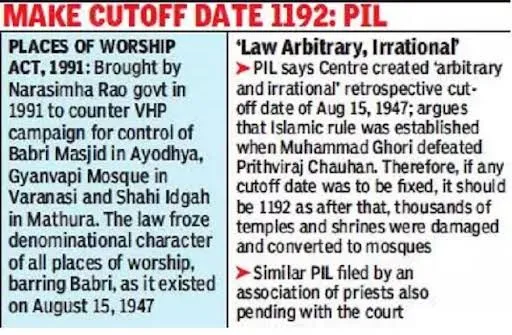Description

Copyright infringement not intended
In News
- Recently the Places of Worship Act of 1991 was in news due to several Religious and Political events.
The Places of Worship Act, 1991
- The Places of Worship Act 1991 was passed by parliament during the Ram Janmabhoomi movement.
- The Act was introduced to promote peace, harmony and brotherhood.
- The main objective of the Act is to maintain the religious character of any such place as it existed on the 15th day of August 1947 (at the time of Independence).
- The act prohibits conversion of any place of worship or changing the religious character of any place from its status at the time of Independence.
- The main purpose behind the Act was to check and control communal hatred and promote peace and harmony in the country.
- The 1991 Act covered all disputed sites to which religious groups had raised a claim.
- The Ram Janmabhoomi-Babri case was excluded from the provision of the Act.
- Section 4(2) of the Act says that any legal proceeding concerning the conversion of the religious character of any place of worship existing on August 15, 1947, pending before any court, shall be dropped and no fresh suit or legal proceeding shall be initiated.

Way Forward
- India was not a constitutional democracy before August 15, 1947. There was no rule of law during the medieval period when a temple was allegedly destroyed.
- In the past, the rule of law did not exist and the polity was characterized by an expansionist attitude.
- The medieval polity was quite different from the modern Indian political entity.
- But today, we live in a modern democracy with constitutional values and follow rule of law.
- The recent incidents appear to be a part of an agenda to create deep communal divides and serious injuries to peace and harmony and undermine the country’s social and political fabric.
- The Supreme Court in the demolition of the Babri Masjid case has described it as a criminal act.
- The court said that “the State has a constitutional commitment and constitutional obligations to uphold the equality of all religions and secularism which is a part of the basic features of the Constitution”.
- The Court concluded that the Places of Worship Act 1991 is necessary for upholding our commitment to secularism under the Indian Constitution.
- The Government, Administration and Courts must decide the case based on law and constitutional values instead of emotions and Majoritarianism political pressure.
https://indianexpress.com/article/explained/kashi-vishwanath-temple-gyanvapi-mosque-dispute-1991-places-of-worship-act-8146773/
https://indianexpress.com/article/explained/places-of-worship-act-1991-scales-tilt-in-favour-of-claimant-seeking-change-gyanvapi-mosque-case-8147244/
https://t.me/+hJqMV1O0se03Njk9















